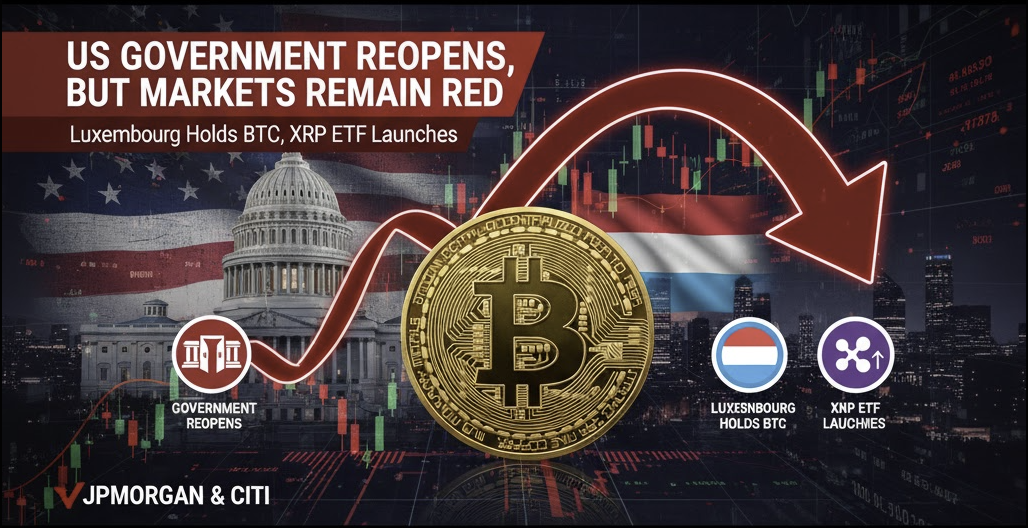Macroeconomic and tariff news continues to drive volatility, causing both US stocks and crypto to correct. Meanwhile, internal conflicts within the Ethereum Foundation are emerging.
Market Overview
Stock Market Plunge & Corporate Updates
US equities closed with a notable decline across all three indices on Wednesday (October 22nd, US), with the Nasdaq dropping the most at 0.93%. Stock futures continued their decline. Oil rose slightly to $59.3 per barrel. Gold recovered slightly to $4105 per ounce after an earlier dip.

Several US companies released Q3 reports. Tesla reported Q3 revenue up 12% to $28.1 billion, recovering from revenue drops in the previous two quarters. However, earnings missed estimates due to soaring capital costs. Meta announced it would lay off about 600 employees in its AI division, according to a spokesperson for CNBC. These cuts do not affect staff at TBD Labs, which includes many top AI experts Meta hired this summer. The layoffs are an effort by Meta to streamline the division and consolidate control over its AI strategy.
Crypto Correction & ETF Outflows
Bitcoin fell to around $107,000 before recovering slightly to $108,500. The overall crypto market capitalization stands at $3.75 trillion. US BTC spot ETFs saw outflows of $101.4 million amidst the market decline. Not surprisingly, ETH spot ETFs also saw $18.9 million in outflows. The SOL ETF recorded zero net flow.

Tariff Update: Trump Sanctions Russia
The Trump administration imposed new sanctions on two major Russian oil conglomerates, Rosneft and Lukoil, due to Moscow's "lack of serious commitment" to ending the war in Ukraine. The US Treasury stated the goal is to weaken the Kremlin's revenue and that it is prepared to broaden measures if necessary. Immediately after the announcement, Brent crude oil prices rose nearly 3% to $64.4/barrel, and WTI crude hit $60.2/barrel. The sanctions are believed to be linked to the failed meeting plan between President Trump and President Putin, and the US is also pressuring India to reduce its imports of Russian oil.
Following this, news emerged that the US and India are nearing the finalization of a long-awaited bilateral trade agreement, which would see India's export tariffs to the US drop to 15–16%, compared to the current level of about 50%. The agreement focuses on energy and agriculture, with India expected to gradually reduce its crude oil imports from Russia (currently about 34% of total imports) in exchange for lower tariffs from the US. Both sides are also negotiating for greater US market access for non-GMO corn and soybeans, although the issue of milk remains unresolved. The agreement is nearly finalized and may be announced at the ASEAN Summit later this month during a meeting between President Trump and Prime Minister Modi. This deal is expected to boost US agricultural exports, ease India's trade burden, and strengthen bilateral relations.
Crypto Leaders Meet US Congress to Push Legislation
Top leaders in the crypto industry, along with President Trump's Crypto & AI Advisor, met with several US Senators to push for a clear legal framework for the digital asset market before the midterm elections. The goal of the discussions is to restart bipartisan dialogue and get the crypto bill to President Trump's desk this year.

In the morning, David Sacks emphasized to Republican Senators that establishing crypto regulations is a top priority for the Trump administration. However, Senator John Kennedy expressed concern that the current bill is too complex and could slow the passage process. At noon, Senator Kirsten Gillibrand met with leaders from Coinbase, Ripple, Chainlink, and Uniswap to mend relations after disputes over DeFi regulations. In the afternoon, Senators Tim Scott and Cynthia Lummis continued to chair another meeting with industry representatives to find common ground between the two parties.
Both the Democratic and Republican parties are striving to narrow their differences to push for a new legal framework for the US crypto market, especially as digital assets become a familiar topic in traditional finance. Fidelity stated that the number of clients asking about crypto in financial consultations is surging, reflecting growing interest in this asset class. With over $16.4 trillion in assets under management, Fidelity encourages advisors to help clients understand the mechanics, risk levels, and safe custody methods. The company also noted that Bitcoin is currently less volatile than some major stocks like Meta, NVIDIA, and Tesla.
Internal Tensions at Ethereum
The Ethereum internal community is facing a crisis of confidence as several key figures publicly criticize the Ethereum Foundation and Vitalik Buterin's leadership. The dissent was initiated by Péter Szilágyi, the lead developer for Go Ethereum (Geth) and a long-time project contributor, who publicly expressed disappointment over the imbalance between image and reality within the organization. He stated that he felt like a "symbolic leader," while his real voice was not respected. Péter also pointed out financial injustice, where core developers were underpaid, forcing them to seek compensation through outside projects, increasing the risk of conflicts of interest. He accused the Ethereum Foundation of being increasingly controlled by a small group of 5–10 individuals close to Vitalik, who control most major projects. This runs contrary to the initial spirit of decentralization.

Following this, Sandeep Nailwal, CEO of Polygon, shared similar disappointment. He argued that the Ethereum community is becoming chaotic and disconnected, even failing to acknowledge Polygon's contributions despite the project's efforts to expand crucial infrastructure for the ecosystem. Sandeep admitted his loyalty to Ethereum is wavering and warned that if this division persists, partners might have to go their separate ways.
Andre Cronje, founder of Fantom and the "father of yield farming," followed up with a blunt question: if the Ethereum Foundation is not supporting core developers like Péter or major partners like Polygon, then what is the fund's massive resource pool being used for? In response, Vitalik Buterin only posted a message thanking Polygon and Sandeep, emphasizing their important role in the ecosystem and in zkEVM technology research, but did not directly address the accusations of favoritism and centralized control within the Foundation. This situation indicates serious cracks within Ethereum's core development team, partner projects, and Foundation leadership. If unresolved, these disagreements could weaken Ethereum's position at a time when other ecosystems like Solana are growing rapidly and attracting more developers.
Other Key Crypto & Market Updates
Robinhood has officially listed BNB, opening trading for US users. This move follows Coinbase adding BNB to its pending listing queue, showing that major US exchanges are beginning to support this token after years of hesitation. The event reflects a typical "herd effect" in the market, where Coinbase acts as a pioneer and other exchanges subsequently follow suit.
Bealls Inc., a 110-year-old retail conglomerate with over 660 stores in the US, officially began accepting payments in crypto via the Flexa platform. Customers can use Bitcoin, Ethereum, USDC, and over 90 other cryptocurrencies. Bealls becomes the first national retailer in the US to accept crypto from multiple blockchains, marking an innovative step on its 110th anniversary.
Russia officially permitted businesses to use Bitcoin for international transactions, aimed at circumventing Western sanctions and reducing dependence on the USD and the SWIFT system. As a major crypto mining country, Russia has an abundant supply of Bitcoin to facilitate international trade. Experts predict that other BRICS nations like China, Iran, and Venezuela may follow suit. This is a major turning point, as Russia had previously banned crypto payments but now fully allows them for exports and energy transactions.
Jim Cramer reaffirmed that his call to sell gold was correct, arguing that gold has now become a speculative "meme asset" similar to Bitcoin. He forecasted that crypto could see short-term gains but warned the market is in a dot-com-like bubble, full of risk and speculation. Cramer also mentioned JPMorgan's $1.5 trillion fund as a factor contributing to the speculative frenzy, advising investors to take profits before losses occur.
The Smarter Web Company just bought an additional 10 BTC at an average price of 83,258 Euros (approximately $111,591), raising its total holdings to 2,660 BTC, valued at about 220.4 million Euros.
The Hong Kong Securities and Futures Commission (SFC) approved the ChinaAMC Solana ETF, making it the first Spot Solana ETF in Hong Kong. The fund will begin trading on the HKEX on October 27th under tickers 3460 (HKD), 83460 (RMB), and 9460 (USD). It will track the CME CF Solana-USD index and will not engage in staking.
Sources
- The New York Times
- Fox Business
- Bloomberg
- SEC
- White House Press Office
- Tesla Investor Relations
- Meta (CNBC Report)
- Ethereum Foundation (Péter Szilágyi, Sandeep Nailwal)
- Robinhood Official Announcements
- Bealls Inc. Official Announcements
- Flexa Platform
- Russian Federation Official Statements
- Jim Cramer (CNBC)
- The Smarter Web Company Investor Relations
- HK SFC Official Announcements
- ChinaAMC
Disclaimer
This article is for informational purposes only and should not be considered financial advice. Please do your own research before making investment decisions.


.png)





